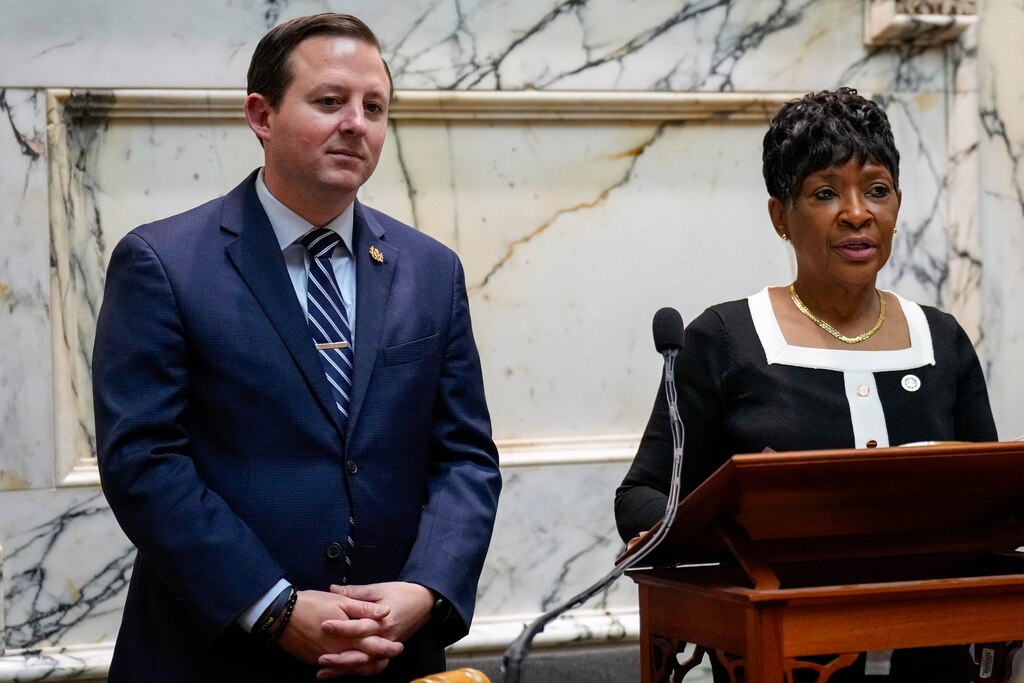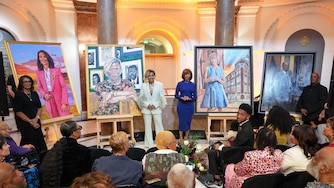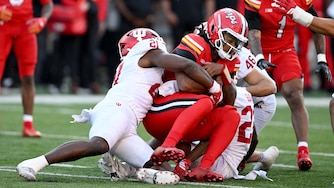It was Thursday afternoon, almost 24 hours after the assassination of conservative pundit and activist Charlie Kirk, and Mayor Brandon Scott’s phone vibrated with an alert from the police department. There’d been a bomb threat to a residence in the city, and Scott immediately recognized the address.
“I’m like, ‘Oh shit, that’s Bill Ferguson’s address,” Scott said in an interview Friday. “The first thing I did was call him.”
The threat on the Maryland Senate president’s house proved to be unfounded, as did a similar threat to House Speaker Adrienne A. Jones’ residence in Baltimore County that afternoon. Those threats, coupled with a similar hoax at the Naval Academy that resulted in a midshipman getting injured, are part of a wave of uncertainty and worry gripping Maryland and the nation in recent days.
The preeminent leader of conservative youth and a close ally of the Trump administration, Kirk was killed Wednesday during a speaking event at Utah Valley University. His death sent shock waves through political circles even as such violence has become more common in recent years.
Now Maryland’s leaders at all levels and from both parties are weighing whether to increase their own security while struggling to determine the path forward.
“The truth is, I don’t know where we go from here,” Scott said, adding that he hopes “people take a step back and realize we have deep issues we have to work with in this country.”
Read More
With tensions so high — a handful of right-wing commentators have made statements saying Kirk’s death means war — some residents are convinced more violence is on the horizon.
“I believe this is a fire starter. I think this is something that is going to continue to polarize us,” said Christina Daley, who lives in the city and manages a bar.
She believes President Donald Trump will take retribution for Kirk’s death by sending the National Guard to Democratic cities like Baltimore.
“I live in the heart of the city with people who are struggling every day. I worry about my children walking to school,” she said, describing herself as a white woman with biracial children she worries might be mistakenly picked up off the street by agents with U.S. Immigration and Customs Enforcement.
Damon Jones, an Anne Arundel County IT professional and business owner, said he worries Republicans in Congress will use the current climate to enact some semblance of martial law.
“We have so many false narratives out there and people believing things that aren’t true. That is the breaking point,” Jones said.
Elected officials such as Democratic U.S. Rep. Johnny Olszewski Jr. are worried too. He said he has had conversations about tightening security for him, his family and his staff in recent days.
“It’s really awful that people have to think about their own safety and security as a function of wanting to serve their communities and their country,” Olszewski said.
Some elected officials know better than others what it is like to constantly receive threats. Gov. Wes Moore said he has received numerous threats since taking office in 2023, which is partly because of the state’s past and partly because of his race.
“In Maryland we have to understand that there is a history and there’s a context,” Moore said. “And the reality of being the nation’s only Black governor and what that means.”
Scott said he has received threats with regularity since he donned a Colin Kaepernick jersey and stood with his hands behind his back during the pledge of allegiance as a City Council member at a 2016 meeting. Recently, as an example of the vitriol, Scott posted a voicemail online in which the caller repeatedly called him a racial slur.

“People just have to understand that this isn’t just a game,” Scott said. “And I think that for me, and for for Black leaders, we know that.”
Politicians around the country have started rethinking their public event schedules in light of Kirk’s death. Alexandria Ocasio-Cortez, the progressive congresswoman from New York, canceled a rally this weekend out of safety concerns. In Maryland, lawmakers who are gearing up for reelection campaigns next year will have to do so while balancing the need to engage with the public and to stay safe.
“We are public-facing individuals that represent large groups of people. In order to get elected, we have to be out there speaking to them, meeting with them and going to events,” said Sen. Steve Hershey, the Republican minority leader from the Eastern Shore who is also considering a run for governor.
“These recent events have made all of that very concerning,” Hershey said.
Trump, while calling for nonviolence, has decided whom to blame for this moment.
“The radicals on the left are the problem, and they’re vicious and they’re horrible and they’re politically savvy,” Trump said Friday morning on “Fox & Friends.”
Rhetoric like Trump’s, once considered beyond the pale in mainstream political debate, is fairly family-friendly compared to the public, violent and vulgar back-and-forths found online.
Ferguson, the Senate president, said too often people see elected officials and public figures not as human beings but as symbols. The media and communications environment, including social media that thrives on fear, can strip humanity from people who are in the news.
“We are just filling some sort of role, some caricature, that we are not flesh and blood with kids and families and siblings,” he said, adding, “It starts to get to a point where the cost gets so high that you have to wonder who wants to get into the line of work to serve the public.”

U.S. Rep. Jamie Raskin, one of the most outspoken Democrats in Congress, said he and his colleagues are sadly familiar with hate mail and death threats. But he’s more worried about what violent and destabilizing rhetoric means for the nation.
“The social contract has been ravaged by so much violence,” Raskin said. “That’s why this week has felt so scary to people. People feel like society is fraying at the seams.”
Del. Jason Buckel, the House Republican minority leader from Allegany County, said although he and his Democratic counterpart, majority leader David Moon, have talked this week about the need for civil debate, such calls would not reach as broad an audience.
“He and I showing up tomorrow in Annapolis and saying that does not permeate as many minds and social media news feeds as what some crazy person spewing hate can do,” Buckel said.
Social media can feel like a trip into the Wild West — videos of Kirk’s death were widely circulated on X almost immediately after it happened — and it can be difficult if not impossible to separate fact from fiction, as was the case in the Naval Academy incident.
With so much time spent scrolling feeds online, Moore said, it is important people remember there are “overseas forces and bots” who are using social media to further divide Americans along political, racial and class lines.
“We’ve got to log off and get to know each other again,” Moore said. “We have to find ways of creating a measure of closeness, real personal closeness with people.”
Liz Bowie, Céilí Doyle, Emily Opilo and Brenda Wintrode contributed to this article.




Comments
Welcome to The Banner's subscriber-only commenting community. Please review our community guidelines.